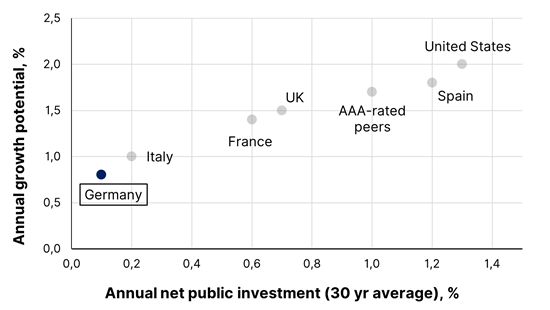Announcements
Drinks
Germany: reforming the debt brake could raise public investment and support growth
By Eiko Sievert, Director, Sovereign Ratings
Germany’s constitutional court ruling on the federal supplementary budget of 2021 and its strict interpretation of debt-brake borrowing limitations have reinforced the country’s rigid fiscal rules but also intensified debate on their possible reform.
Such reform could encourage future German governments to increase long-term investment and address a EUR 300bn investment lag, while raising the country’s growth potential. Over the past three decades, Germany’s net public sector investment has fallen behind AAA-rated sovereigns and other large economies (Figure 1).
The fiscal space to increase investment is available. The question remains whether political consensus can be achieved to agree on a reformed debt brake that enables effective use of this fiscal space.
Low levels of public sector investment have curbed Germany’s growth potential which we estimate at around 0.8%, the lowest among AAA-rated sovereigns (averaging 1.7%) and below other large economies such as the United States (AA/Negative; 2.0%), France (AA/Negative; 1.4%), the United Kingdom (AA/Stable; 1.5%), Italy (BBB+/Stable; 1.0%), and Spain (A-/Stable; 1.8%).
Figure 1: Low German public sector investment contributes to its low growth potential
Growth potential, % and general government net fixed capital formation, % of GDP

Source: European Commission, Scope Ratings
Note: AAA-rated countries include Austria, Denmark, Luxembourg, the Netherlands, Norway, Sweden, Switzerland. Net public investment is only one factor contributing to a country’s growth potential. Others include private sector investments to raise the capital stock, demographics, and employment dynamics.
Reforming the debt brake to help increase long-term investment
A range of proposals are being discussed regarding possible ways to ease the debt brake, all of which are in line with the recently re-adopted EU fiscal rules.
Possible reforms include leaving the debt-brake rule unchanged or loosening the deficit restriction depending on the level of debt and allowing more time after a crisis to return to deficit targets. Another option is excluding net investments from the debt brake limitations to finance long-term capital expenditure. Alternatively, Germany could set up a constitutionally anchored special fund for green and digital transformation spending.
Reform proposals with a greater focus on encouraging governments to raise long-term investment are more likely to be effective at supporting Germany’s future growth and competitiveness. However, as any amendment to the debt brake requires a change to the German Basic Law, cross-party political support is needed from the three ruling coalition partners and the largest opposition party CDU/CSU. As such, parties may struggle to agree on what expenditure items count towards qualifying investments.
To be sure, proposals that ease the government deficit limit of 0.35% of GDP based on different debt-to-GDP levels would make the debt brake significantly more flexible. However, such reforms would not address the underlying challenge of making long-term commitments to increase investment spending at the risk of keeping the focus on short-term consumption expenditure, which makes up a large portion of the federal government’s budget. The ministry of labour and social affairs has the largest line item in the 2024 budget, accounting for 38.5% of the total (EUR 171.7bn), of which EUR 127bn will be spent on pension insurance and income support.
Germany has the fiscal space to allow for higher borrowing limits
Germany has fiscal space to fund higher public spending to support the energy transition. If future budgets make full use of the current government deficit limit of 0.35% of GDP under the existing debt brake (assuming no additional emergency borrowing and a largely balanced cyclical component), the country’s debt-to-GDP ratio will continue to decrease over coming years from 65% in 2023 to around 59% by 2028.
Doubling the deficit to 0.7% of GDP would allow for additional spending of around EUR 80bn over the next five years, with the debt-to-GDP ratio stabilising at around 61%.
Considering the two most recent large global shocks with a big impact on Germany’s indebtedness, this still gives sufficient fiscal buffers to respond to future crises. The 2008 global financial crisis increased the debt ratio by around 17.8pps between 2007 and 2010, while the 2019 pandemic and energy crises resulted in an increase of 9.4pps between 2019 and 2022.
While every economic shock is unique, the current debt trajectory implies that Germany will have sufficient fiscal buffers for the debt ratio to remain below its 2010 peak of 82%, even if there was a shock to public sector balance sheets equivalent to that of the global financial crisis.
While the coalition government quickly agreed a revised budget for 2024, reaching consensus on next year’s budget is likely to be more challenging. The government will have exhausted the reserves in its climate and transformation fund, making contributions from the 2025 and 2026 budgets necessary to fund future investment.
Make sure you stay up to date with Scope’s ratings and research by signing up to our newsletters across credit, ESG and funds. Click here to register.







